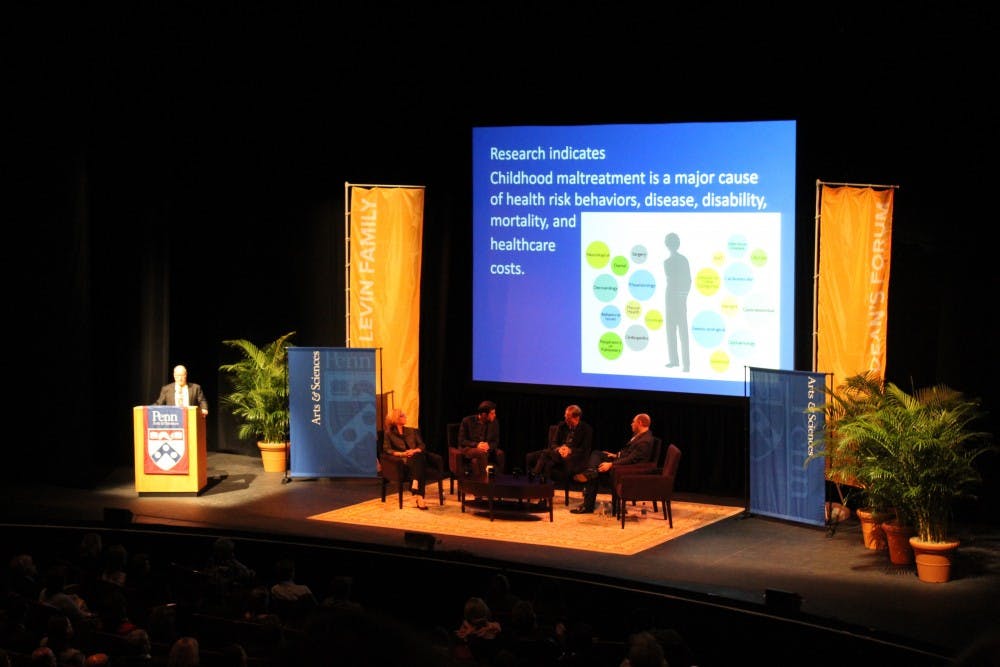“Can you imagine being a child in the Catholic church and having a priest pay attention to you?,” commented Dr. Steven J. Berkowitz, halfway through his talk about sex abuse and childhood trauma at the 2016 Levin Family Dean’s Forum.
A yearly celebration of liberal arts in the College of Arts and Sciences, the Forum this past Wednesday discussed “How Hollywood is Spotlighting Social Change,” and brought together a panel of social scientists and a writer and actor who worked on this year’s Best Picture–winning Spotlight.
After a brief introduction by Steven J. Fluharty, the Dean of SAS, Dr. Berkowitz began his presentation on the psychological effects of childhood abuse.
“This happens in every institution that works with children in this country,” he explained to a somber crowd of adult visitors and Penn students. He began by discussing the story that the Boston Globe broke about the Catholic Church’s cover–up of countless sex abuse scandals in the Boston diocese, as dramatically portrayed in Spotlight. By moving priests into different churches or placing them on undisclosed leaves, the Church was able to reach settlements with several of the victim’s families and control the spiraling damage of the issue.
“Over 80 percent were boys and over 80 percent were in their adolescence,” Dr. Berkowitz noted, explaining the difficulty with which survivors had coming forward and talking to reporters about their horrific pasts. As a clinical psychiatrist, he discussed how traumatic sexualization, betrayal, powerlessness and stigma all interplay in clergy sex scandals to damage and complicate a child’s emotional and psychological development.
Because disclosure is difficult and complicated, victims oftentimes do not speak up about what they see as not only painful, but also shameful and embarrassing. Relating his expertise in childhood trauma back to the movie, he discusses the importance of media survivor stories in encouraging victims of abuse to come forward and share their experiences. He postulates that this snowball effect has only led to more disclosures since the release of Spotlight last year: “I don’t think there’s any doubt: Child maltreatment is our number one public health issue and we need to do more about it, and Spotlight is just the beginning.”
As the conversation shifted from psychology to law, Marci Hamilton, an expert in church law at Yeshiva University, came forward to speak about the importance of statutes of limitations in prosecuting child predators. “The real reason there was no justice was the statue of limitations,” she opens, referring to laws that put undue limitation on the length of time after a crime that legal action can be brought forward.
Presenting on the statutes of limitations that exists in various degrees of restrictiveness across the United States, Hamilton rallied for the revival of old statues of limitations, which wouldn’t prevent adults from pursuing legal action about childhood trauma just because they didn’t bring it up in the correct window of time after it happened. She even called protecting children from sexual abuse “the human rights issue of our generation.” To her, Spotlight “is the kind of massive public education we needed, and it came at just the right time for the victims.”
After the academic presentations, the event once again shifted shape as the mic was handed over to Neal Huff, who played Phil Saviano, one of the survivors from the Boston diocese who did much of the leg work in helping lead the Globe journalists to other survivors who came forward. Huff spoke to his childhood experience as an adolescent in identifying potential predators in school, but how one of his best friends didn’t have the same luck in avoiding abuse.
Huff's character, while afflicted with AIDS, organized SNAP (Survivor's Network of Those Abused by Priests) to bring together victims of pedophilia in a support group setting. Huff, quoting Saviano, helped to shed some light on why it was so difficult for many to speak out: "When you're a poor kid from a poor family, religion means a lot." This context is important in echoing the sentiments of Dr. Berkowitz and Hamilton, as to why a more nuanced understanding of childhood sexual abuse is necessary for the public.
To cap off the forum before the short Q&A, Josh Singer, writer and producer of Spotlight, spoke about his enthusiasm about the positive social impact he has seen his movie have. He helped to host a survivor screening for over 1,500 sexual assault survivors in LA, and hopes that the additional Oscar buzz will increase public viewership and knowledge of these issues. “The real message of the movie is that we all need to look, we all need to listen, we all need to be open to these folks when they come forward as opposed to looking away."

